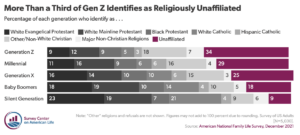
As ministry leaders, we’ve embraced a common narrative about the exodus of young people and young adults from the church—we know this generation is fed up with the church’s hypocrisy, disinterest in social justice, and general irrelevance. But a new study by the American Enterprise Institute, a conservative-leaning Washington DC think-tank, reveals a more nuanced picture…
“Young adults today have had entirely different religious and social experiences than previous generations did,” writes the Institute’s Director of the Survey Center on American Life, Daniel A. Cox. “The parents of millennials and Generation Z did less to encourage regular participation in formal worship services and model religious behaviors in their children than had previous generations. Many childhood religious activities that were once common, such as saying grace, have become more of the exception than the norm.” The comparison to previous generations requires us to capture the big picture again. Here is the Institute’s sloping graph of religious identity, stretching back to the Silent Generation—pay attention to the stairstep bars on the right…

The factors driving what researchers call “disaffiliation” are more diverse than our narratives typically include, and are important to pay attention to as we consider shifts in our calling…
- Childhood experiences of a “robust” faith, anchored in the authentic relationship with God modeled by parents, fuel a lifetime trajectory in the church. Cox says, “If someone had robust religious experiences growing up, they are likely to maintain those beliefs and practices into adulthood. Without robust religious experiences to draw on, Americans feel less connected to the traditions and beliefs of their parents’ faith… [And] there is little evidence to suggest that Americans who have disaffiliated will ever return.”
- Involvement in “formal religious activities” is much less common for young people today than a generation ago. Almost two-thirds of Boomers attended religious services with their parents, but that drops to 45 percent for Millennials and 40 percent for Gen Z. Sunday school participation reveals a similar gap—again, almost two-thirds of Boomers attended some kind of religious education program, while only four out of ten Millennials (43 percent) and Gen Zers (42 percent) have done the same.
- Involvement in “informal religious activities” at home have actually been more common for young people than a generation ago. Fewer than one out of five Boomers (17 percent) say they read Scripture or religious stories with their families once a week, but a quarter of Millennials (24 percent) and Gen Zers (21 percent) said so.
- Weak involvement in a relational faith as a child leads to a slow decline in interest and engagement in the church. Cox says: “Most Americans who have disaffiliated from their childhood religion cannot point to a single event or incident that precipitated their departure. Rather, most say they gradually drifted away or, at some point, decided they no longer believed in their religion’s teachings or beliefs.”
- The level of warmth and closeness kids experience with their parents is an important factor in their decision to stay with or leave the church. More than half of those who stayed involved in their church into adulthood (54 percent) say they turned to their parents first when they had a problem. Just forty-one percent of those who left their faith said the same.
- Kids raised in theologically liberal homes are four times more likely to leave the church later on than kids raised in theologically conversative homes. Just over three in ten people who were raised in a theologically liberal tradition (31 percent) have left the church. In contrast, fewer than one in ten people from conservative homes (7 percent) have disaffiliated.
- Once their family disaffiliates, kids raised in those homes tend to stay disaffiliated into adulthood.“One of the most significant changes in patterns of religious change is the rising retention rate of nonreligious Americans,” says Cox. “Today, nearly two-thirds (65 percent) of Americans who report having no childhood religious affiliation say they still are unaffiliated as adults, rivaling that of established religious traditions… Over the past 15 years, the retention rate for religiously unaffiliated Americans increased by nearly 20 points.”
If you think of these bullet-points as streams of disaffection all flowing into a river of decline, what might be our “paddling priorities”? A couple that coincide with Vibrant Faith’s new four-year research project “4th-Soil Parenting” are worth highlighting:
- Shifting our attention from the church to the home as the focus of our equipping, creativity, and pastoral innovation.
- Focusing on both parents’ vertical relationship with God and their horizontal relationship with their kids is key to the crucial process of identifying as a follower of Jesus into adulthood. This means we treat the pastoring of parents as an intentional emphasis, and the mentoring of parents as “warm and authoritative” influencers in the home as a priority.
We know from previous research that parents who understand their role as a calling, not just a life stage, embrace both of these priorities. That’s why we’re releasing (next Tuesday) a new resource called Lives of Meaning and Purpose, a ministry kit developed out of our five-year project “Creating a Culture of Calling.” Check it out, HERE

Rick Lawrence is Executive Director of Vibrant Faith—he created the new curriculum Following Jesus. He’s editor of the Jesus-Centered Bible and author of 40 books, including The Suicide Solution,The Jesus-Centered Life and Jesus-Centered Daily. He hosts the podcast Paying Ridiculous Attention to Jesus.



